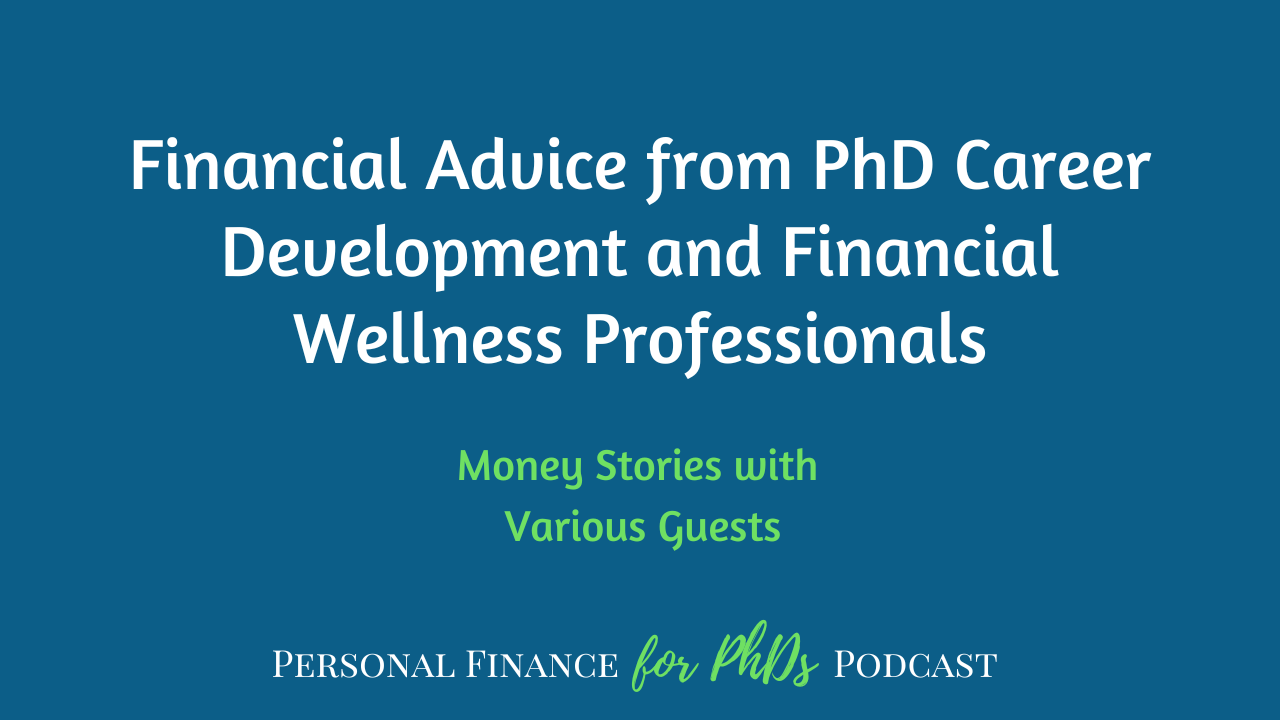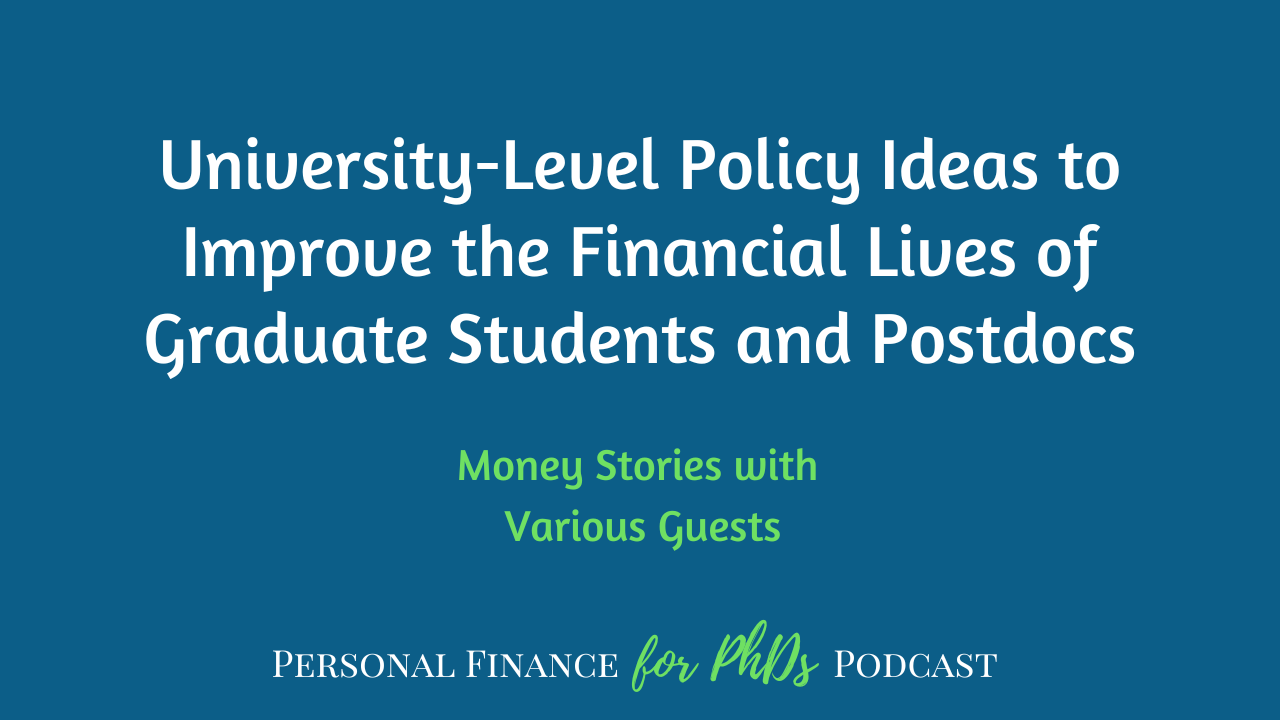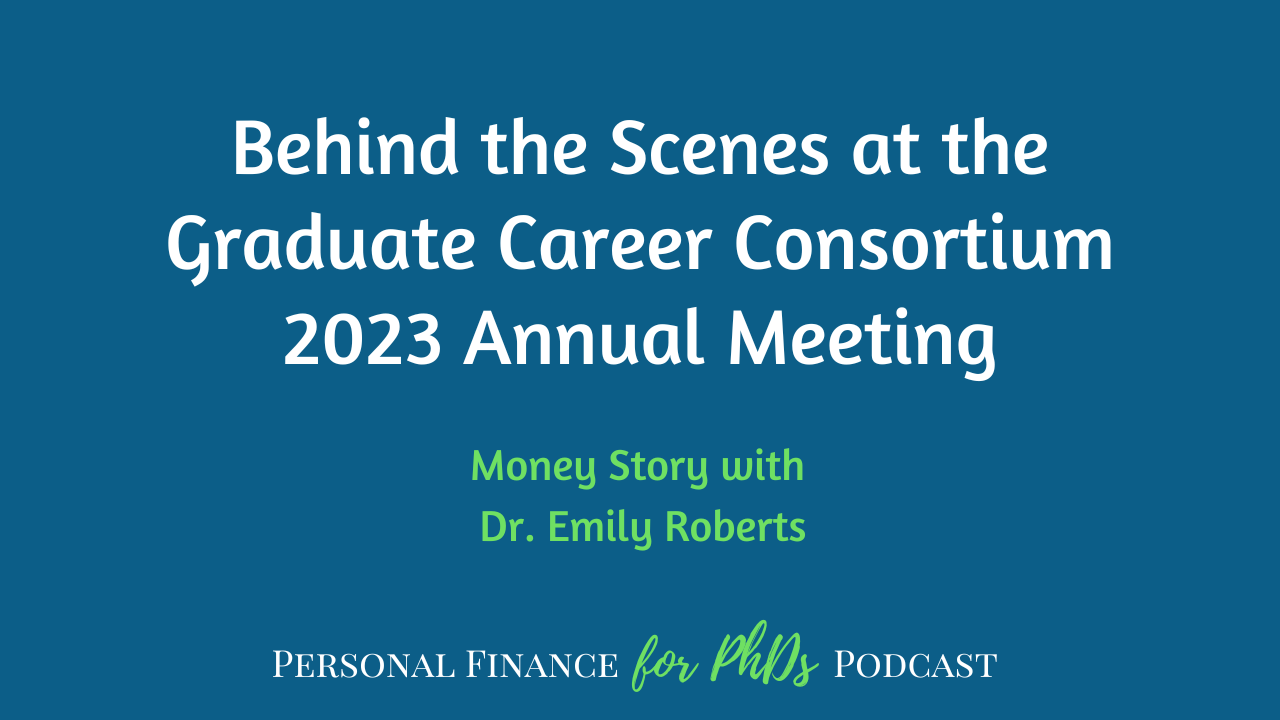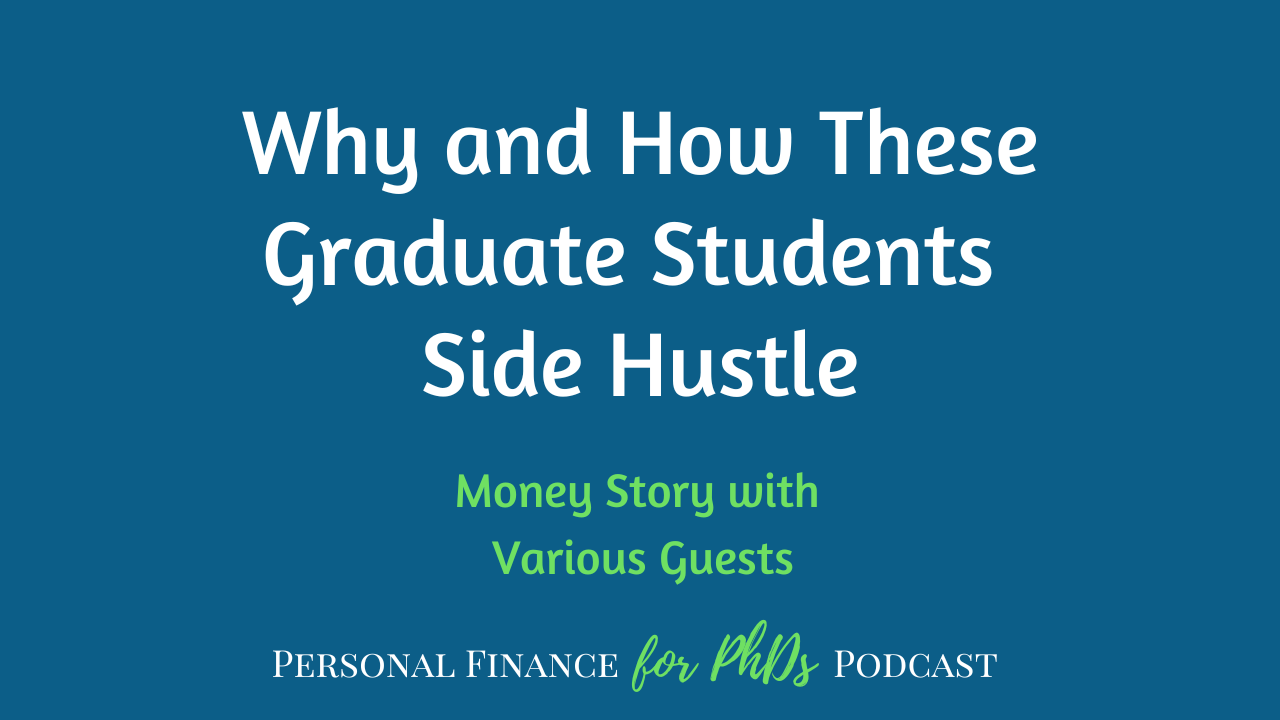In this episode, Emily narrates the origin story of her business, Personal Finance for PhDs, which started as a personal interest when she graduated from college. She also shares why she has devoted her career to financial education for PhDs and the behind-the-scenes business operations. This episode is for you if you are an avid follower of Personal Finance for PhDs, a personal finance enthusiast, or interested in solopreneurship yourself.
Links mentioned in the Episode
- PF for PhDs Quarterly Estimated Tax for Fellowship Recipients
- PF for PhDs Tax Center for PhDs-in-Training
- Emily’s E-mail Address
- PF for PhDs Subscribe to Mailing List
- PF for PhDs Podcast Hub
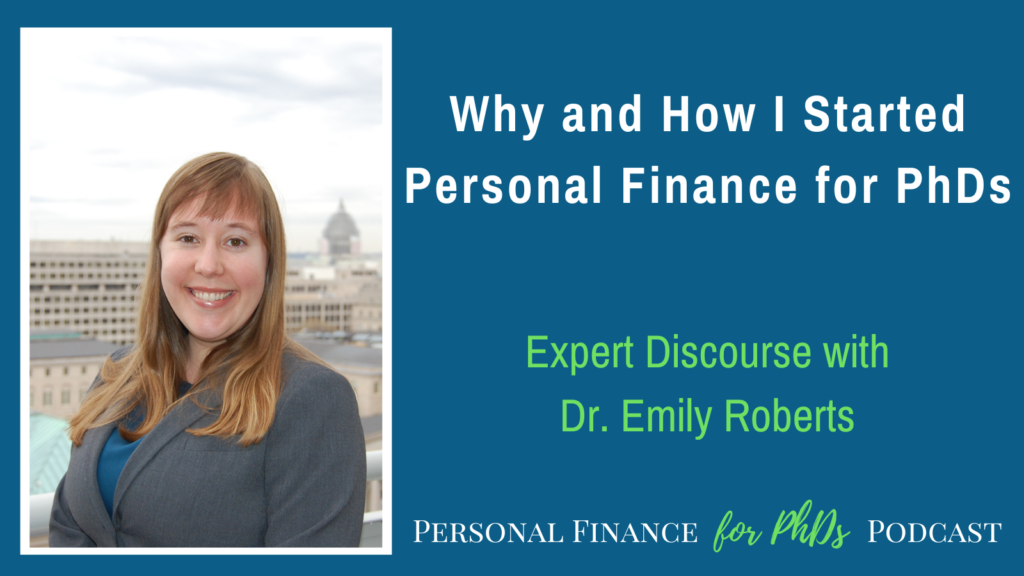
Teaser
00:00 Emily: You are so smart, so talented, so capable, so visionary—you are such an extraordinary group of people—that I want you to be able to experience personal wellness and satisfaction and live out your values and have a wildly impactful life. I don’t want you to feel hamstrung by money. I want you to be free to apply your incredible energy to your professional pursuits and personal lives and not be stressed or distracted or held back by your finances.
Introduction
00:33 Emily: Welcome to the Personal Finance for PhDs Podcast: A Higher Education in Personal Finance. This podcast is for PhDs and PhDs-to-be who want to explore the hidden curriculum of finances to learn the best practices for money management, career advancement, and advocacy for yourself and others. I’m your host, Dr. Emily Roberts, a financial educator specializing in early-career PhDs and founder of Personal Finance for PhDs.
01:01 Emily: This is Season 17, Episode 1, and today is a solo episode for me on Personal Finance for PhDs. I’ve been asked more and more in recent years how and why I started the business, so I’m taking this opportunity to tell you the origin story of Personal Finance for PhDs, why I’ve chosen financial education for PhDs as my career, and what my day-to-day work looks like. This episode is for you if you are an avid follower of Personal Finance for PhDs, a personal finance enthusiast, or interested in solopreneurship yourself. These action items are for you if you switched onto non-W-2 fellowship income as a grad student, postdoc, or postbac last fall and are not having income tax withheld from your stipend or salary.
01:50 Emily: Action item #1: Fill out the Estimated Tax Worksheet on page 8 of IRS Form 1040-ES. This worksheet will estimate how much income tax you will owe in 2023 and tell you whether you are required to make manual tax payments on a quarterly basis. The next quarterly estimated tax due date is January 16, 2024.
02:12 Emily: Action item #2: Whether you are required to make estimated tax payments or pay a lump sum at tax time, open a separate, named savings account for your future tax payments. Calculate the fraction of each paycheck that will ultimately go toward tax and set up an automated recurring transfer from your checking account to your tax savings account to prepare for that bill. This is what I call a system of self-withholding, and I suggest putting it in place starting with your very first fellowship paycheck so that you don’t get into a financial bind when the payment deadline arrives.
02:48 Emily: If you need some help with the Estimated Tax Worksheet or want to ask me a question, please consider joining my workshop, Quarterly Estimated Tax for Fellowship Recipients. It explains every line of the worksheet and answers the common questions that PhD trainees have about estimated tax. The workshop includes 1.75 hours of video content, a spreadsheet, and invitations to at least one live Q&A call each quarter this tax year. If you want to purchase this workshop as an individual, go to PF for PhDs dot com slash Q E tax. You can find the show notes for this episode at PFforPhDs.com/s17e1/. Without further ado, here’s my solo episode behind the scenes of Personal Finance for PhDs.
03:38 Emily: I’ve noticed that in the past half-year or so that I’ve been getting more frequent questions about how I got started with my business, whether it’s my full-time job, and just generally why I do this. I realized that while I’ve answered these questions and told these stories numerous times over the years, I’ve never put it together coherently on my website or on this podcast, so that’s what I’m taking this episode to do. In this episode, you’ll hear the origin story of Personal Finance for PhDs, why I’m so passionate about equipping PhDs with skills and knowledge around money, and how I run my business currently. I hope you’ll enjoy this behind-the-scenes look!
Origin
03:38 Emily: My interest in personal finance goes back to my first post-college position, which was as a postbaccalaureate fellow at the National Institutes of Health. I frankly was quite privileged to not have to have given money much thought prior to that point, although in retrospect I absolutely should have. I grew up in the DC area in a middle class family, and my parents really never taught me overtly or explicitly about money beyond going with me to open a checking account when I got to college. When I started my postbac fellowship in 2007, it was the first time I had a full-time non-temporary job, so to speak. My annual stipend was $24,000. Since I had grown up outside of DC on the Virginia side and was now moving back to the same area to work on the Maryland side, I knew that $24,000 was really, really a small amount of money to try to live on in a fairly high cost of living area. I decided at that point to start learning about personal finance. I read a few books, and the one that made the biggest impression on me was Get a Financial Life: Personal Finance in Your Twenties and Thirties by Beth Kobliner. I think my baseline motivation was that I wanted to be responsible with the salary I was receiving. I wanted to do all the right “adulting” things financially, although I don’t believe that word was in popular use yet. The main actions I took following my initial reading were to track my expenses, which I did in Excel; open my first credit card; and start investing for retirement. I didn’t really let the fact of my low income or status as a trainee stop me from following the advice I was reading. Somehow, I didn’t absorb from the books the importance of having an emergency fund, and I kept absolutely no cash savings on hand. I essentially lived paycheck-to-paycheck with the exception of my Roth IRA, to which I was contributing $200 per month, exactly 10% of my stipend income.
06:04 Emily: I started my PhD in biomedical engineering at Duke in 2008, and shortly after was when the financial system and economy really started going downhill and we entered the housing market crash and Great Recession. I felt very secure in my position, so I didn’t have fear or anxiety around the continuity of my income. I again was paid a $24,000 annual stipend, but that effectively felt like a raise since Durham was a moderate cost-of-living city. During those first couple of years of grad school, I kept living pretty much paycheck to paycheck aside from my Roth IRA contributions, and I kept reading personal finance books. In 2010, I got married. My husband was also a grad student at Duke at the time. In 2011, I started reading and commenting on personal finance blogs, and I started my own personal finance blog. This was the heyday of the personal finance blogosphere, and participating in that became a serious hobby for me. I posted three times per week, mostly short essays or musings on personal finance tactics or strategy and updates on how we were spending our money. My blog was always small in terms of readership. What I observed in Google Analytics, however, was that my posts about grad student-specific topics actually had sustained traffic from search engines, specifically my posts about taxes and IRAs. I didn’t know a lot about those topics at that point, but I knew my own experiences and what I had read on the IRS website, so I was simply sharing that. But the insight I gained was that grad students were searching for these topics, and there weren’t many good sources of information, because my little blog was actually ranking well enough in search that people were visiting it. Also in that period, I attended any and all financially-related seminars that Duke hosted. I want to say first that I appreciated and still appreciate that Duke was making any kind of effort at all to provide financial education to its graduate students, but the content of the programming wasn’t exactly what was needed, in my opinion.
07:58 Emily: I remember a couple of seminars in particular from around that time. The first seminar was when a local wealth management firm sent a couple of representatives over to give a talk on investing. I attended with high hopes that they would discuss how to invest in IRAs. Instead, they talked about utilizing 401(k)s while repaying gigantic student loan debts. These advisors were clearly speaking to the professional students in the room, the future doctors and lawyers, about how they could invest post-graduation, while completely overlooking the PhD students who actually had the cash flow to be able to invest in the present. The second seminar was on tax return preparation by a local CPA. While I did glean some useful insights, my overall impression was that the person wasn’t speaking to the specific situation that the stipend-receiving graduate students in the room were facing, spending way too much time on general background information and the less-relevant higher education tax benefits and no time at all on how to deal with Duke’s confusing reporting of fellowship income. Basically, they were speaking from their experience preparing tax returns for the parents of college students, not to the audience’s experience of receiving a Form 1099-MISC but not a Form 1098-T.
09:11 Emily: In 2012, Duke started a personal finance initiative called Personal Finance @ Duke, and I volunteered as the grad student representative on the planning committee. Basically, I was there to make sure that some PhD student-specific educational programming was offered, and later on to help orient the speakers to the financial peculiarities of our population and the types of questions the audience would have. However, despite our best efforts with that tax firm, for example, we were never able to get the speakers to really meet the unusual concerns of our audience. That was when I started thinking, “I could teach this material better than these professionals are. I’m less qualified, but I know this audience better.” Fast-forward to the summer of 2014 when my husband and I both successfully defended our PhDs. My husband decided to stay on as a postdoc in his PhD advisor’s lab to get a couple more papers out the door. My advisor moved from Duke to Columbia, so there was no opportunity for me to stay on in a similar way, and in fact my defense date had been rushed due to my advisor’s schedule. The last six months of my PhD were incredibly busy, so on the other side of my defense I became happily ‘funemployed,’ as I called it, for the next year. Basically, I gave myself some time to explore and figure out what I wanted to do for my career, since I didn’t want to stay in research any longer. I explored a few career tracks through a short-term fellowship and contractor work, but nothing was exciting me as much as personal finance was. My blog had made a small amount of money in 2014, so I decided to use it to attend FinCon, the financial bloggers conference, in October. What I learned from that conference was that I had no interest in turning my blog into a full-fledged business. However, I attended a session on public speaking, which was the first time I was exposed to the concept of professional public speaking. I learned that there are three strata of public speakers. At the bottom, there are people who speak for free to promote a product or service that their business offers. That’s what those financial advisors and CPAs were doing at Duke. At the top, there are celebrities and politicians who command enormous speaking fees because of their fame and prestige. And in the middle, there are the professional public speakers who receive modest speaking fees in exchange for sharing their professional expertise or personal story. The person who ran that conference session actually spoke on personal finance in K-12 schools, so that was a little indicator to me that schools might host such speakers.
11:34 Emily: The final piece of the puzzle that would become Personal Finance for PhDs was that, with my abundant free time that fall, I volunteered to give my own seminar for Personal Finance @ Duke. Basically, I wanted to teach everything that I had learned about personal finance from books and the blogosphere specifically that would be relevant and actionable for current stipend-receiving graduate students. I had the best time creating the slides, delivering, and answering questions! I knew I wanted, somehow, to make that my career. At that point, I had identified what I consider the three core aspects of my business: 1) The people I serve are my peers on the PhD track, from undergrads applying to PhD programs through to PhDs in their first or so “Real Jobs;” 2) I help these people with their personal finances; 3) I do so through teaching or one-to-many communication. What took a little more time to figure out was exactly who would pay me for this teaching. While I have tried at different times, I am deeply uncomfortable trying to sell anything to my audience directly, particularly the graduate students. Through trial and error and learning from my peers in Dr. Jen Polk’s community, Self-Employed PhD, I identified that my clients, the people who are in a position to pay me for this work, are those who provide professional development programming to graduate students and postdocs, primarily. Mostly they are staff members who work in graduate schools, medical schools, postdoc offices, etc., but I also occasionally work with graduate student groups as well.
Commercial
13:07 Emily: Emily here for a brief interlude! Tax season is in full swing, and the best place to go for information tailored to you as a grad student, postdoc, or postbac, is PFforPhDs.com/tax/. From that page I have linked to all of my free tax resources, many of which I have updated for this tax year. On that page you will find podcast episodes, videos, and articles on all kinds of tax topics relevant to PhDs and PhDs-to-be. There are also opportunities to join the Personal Finance for PhDs mailing list to receive PDF summaries and spreadsheets that you can work with. Again, you can find all of these free resources linked from PFforPhDs.com/tax/. Now back to the interview.
Mission
14:00 Emily: I just gave you the narrative of how I came to start Personal Finance for PhDs, but I haven’t really told you why I cared so much about my personal finances while in graduate school and why I decided to devote my career to helping my peers in this area as well. This is the first time I’ve tried to articulate this mission, so forgive me if it’s a little rough going. There are a couple of foundational truths that I learned about personal finance early on that made it a very compelling area of interest for me. 1) How you use your money is an expression of your unique life values. 2) Having money gives you options. Let’s explore those a little further each in turn.
14:39 Emily: 1. How you use your money is an expression of your unique life values. The more closely aligned your use of money is with your individual values, the more satisfaction you will derive from that money. Money is not the only way you can express your values, but it is a very useful tool. With graduate students and postdocs, and really anyone with a lower income, it’s very difficult to align your use of your money with your values because such a large fraction of it goes toward your basic living expenses. When the vast majority of your income goes toward housing, food, and transportation, you have very limited agency to express your values and derive satisfaction from how you use your money. I find the puzzle of optimizing your use of money within the constraints of life as a graduate student or postdoc very compelling.
15:26 Emily: 2. Having money gives you options. This is an expansion on the first point. When you have money, whether that is in the form of savings, investments, or income in excess of your expenses, you have a greater ability to make choices in your life. You can extract yourself from toxic professional or personal relationships. You can choose where and how you live. You can add a child or a pet to your household or materially support other family members. You can give to causes that you believe in. How can a low-earning young professional generate this kind of financial agency?
16:03 Emily: This probably won’t be a shock to anyone listening, but after my first year or so of graduate school, I didn’t find my research to be consistently fulfilling and it felt very out of my control. I didn’t have consistent or predictable success. I only have this perspective from the many years that have elapsed since I finished my PhD, but I think my interest in and let’s face it at times fixation with my personal finances was a response to those feelings of failure and helplessness in my professional life. Improving my personal finances was something that was much more within my control. I could set and achieve process-based goals and oftentimes effect positive, measurable outcomes. So my interest in personal finance was a form of escapism. Yet, there were downstream benefits of this attention and effort, and I think they can be replicated without the large time and energy investment I underwent. My husband and I experienced what I consider to be great financial success during our seven years of PhD training. We took our combined net worth from a negative number in 2007 to over $100,000 in 2014. That’s an excellent outcome, right there in black and white. What I didn’t appreciate until that point, though, was how having that nest egg and the skills and experiences it took to build it actually could help us in our professional lives. For me, the first thing was that I could be funemployed for that first year after I finished my PhD without sinking our household. My husband’s income went up a bit when he transitioned to being a postdoc, plus I brought in income in fits and starts from my various experiments, so we were still making it month to month. But I felt a lot less pressure about needing to commit to a career and increase my income because I knew we had that nest egg working for us. That money gave me time to explore and eventually find my calling.
17:50 Emily: My husband actually had a similar experience when he finished his postdoc in 2015. He had always thought he would continue in academia or work for a large company—something stable. He came across a job listing for a role that seemed tailor-made for his research expertise and interests. The hiccup was that the job was at a start-up. We didn’t know much about that world, but we knew that he would be paid a bit less in salary and there was a higher possibility of job loss in comparison with being hired by an established company. Again, our nest egg gave him the confidence to take a professional risk and accept that role that he was so well-suited for. I had known from the beginning that your career affects your finances via the income and benefits provided to you. But this is how I learned that your finances can also affect your career. We didn’t know when we started saving and budgeting and everything that those small actions, compounded over time, would end up freeing us professionally to this high degree. This agency and confidence is what I want for all of you, the PhDs and PhDs-to-be. You are so smart, so talented, so capable, so visionary—you are such an extraordinary group of people—that I want you to be able to experience personal wellness and satisfaction and live out your values and have a wildly impactful life. I don’t want you to feel hamstrung by money. I want you to be free to apply your incredible energy to your professional pursuits and personal lives and not be stressed or distracted or held back by your finances. I will feel satisfied if I can, through my teaching, play a tiny role in enabling that success in your life by giving you financial best practices and mindsets and so forth. I don’t want you to have to go through all the self-education and experimentation that I did to get to that point. I’m delighted to interpret and refine general personal finance education for the unique circumstances of a PhD’s life.
19:45 Emily: I’ve been describing working on my own personal finances and teaching you how to work on yours, but it’s become more and more apparent to me over the years that this personal responsibility is only part of the equation. While I still consider that to be core to my teaching, it’s foolish to gloss over the responsibility that universities and funding agencies play in each PhD’s finances by setting the pay rates for assistantships, fellowships, grants, etc. and constructing benefits packages. For graduate students and postdocs to flourish and succeed in their roles, not to mention their lives, they must be paid a living wage and in fact significantly more than a living wage. Of course, personal responsibility is a requirement, but a higher income also confers the benefits I spoke of earlier. It’s obvious to me that graduate students and postdocs must be paid fairly to fulfill their potential and produce the wonderful research and become the wonderful scholars as is expected of them. In fact, by underpaying its trainees, the academic system is undermining itself and driving talented people into other sectors. Related to this issue is one of equity and the hidden curriculum that I often refer to in this podcast. Academia is more diverse and is endeavoring to become more diverse with respect to race, gender, socioeconomic class, etc. than it was in the past, but that means that more and more trainees lack access to the innate resources that their predecessors had, whether that is familial financial support, certain types of financial acumen, or insight into how academia functions, financially. If you are a first-generation college student, your parents are not necessarily able to help you decide how to manage your student loans during graduate school. If you come from a family that has never saved for retirement, you have no one to clue you in about IRAs. If your parents always had simple tax returns that they prepared with software, you don’t have easy access to a CPA to ask questions about your fellowship income. And if you’re an international student or postdoc, you’ve got to figure out how to navigate the US banking and credit systems on top of everything else. I believe universities have a responsibility to teach or at least offer to teach about these nuanced, academia-specific financial topics so that all graduate students and postdocs have access to this information that is critical to their personal wellness—in addition to paying them decently. So that’s my internal motivation for doing what I do. I want all PhDs, regardless of background, to experience personal and professional freedom and fulfillment, similar to what I have, and I believe that money is a crucial tool to master in that process. You have so much to offer the world, and I want the world to benefit from the work you do that is your true calling, all without compromising your personal wellness.
Operations
22:30 Emily: In this final section of this episode, I’d like to give you some details on how I run my business. For example, I am often asked if it’s a side hustle or my full-time job. Personal Finance for PhDs is my sole professional pursuit at this time. I would describe it as a lifestyle business. That is a pejorative term to some people, but I don’t see it in that negative light. I’ll go through now what I do for work, when I work, where I work, and with whom I work.
What I do for work
23:00 Emily: There are two main avenues by which I offer financial education, paid and free. The free financial education includes this podcast, articles on my website, and social media posts. The paid financial education is my work with universities, and, to a much lesser extent, the products I sell to individuals. The educational services and products I provide to university clients include live seminars and webinars and pre-recorded workshops. At this point, the only products I offer to individuals are my pre-recorded tax workshops and membership to the Personal Finance for PhDs Community. What might be interesting to learn about solopreneurship is that only a tiny percentage of my work time is spent actually delivering my revenue-generating financial education. The great majority of my own time as well as my assistants’ time goes to marketing and networking, communicating with clients, preparing presentation materials and rehearsing, and professional development.
When I work
24:00 Emily: I work around my children’s school schedule. In a regular 5-day school week, I’ll work about 20 hours, typically exclusively while they are in school. This gives me a bit of personal time during their school day as well as work time. I take off all of the academic year holidays and vacations that they have, such as Thanksgiving, winter, and spring breaks, federal holidays, etc. Over the summer, when we’re not on vacation, we generally put the kids in day camp so I have those weeks to work as well, maybe with a few extra days off here and there. The exception to this rule is when I travel, when I’m typically working much longer hours. I like this balance personally as well as for our family. I find I’m able to accomplish what I set out to professionally in those limited hours by being very judicious about what I take on, and I also get to spend a lot of time with my children and facilitating their relationships and development. In recent years, I’ve become a student of time management and productivity, and I try to conform my schedule and work habits to the principles I’ve learned. I theme each one of my work days so that I know what I need to do and what I don’t need to do on each day. Mondays are for creating paid content, Tuesdays are for client check-ins, Wednesdays are for business operations, Thursdays are for catch-up, and Fridays are for creating free content. That’s not to say that I don’t do other types of work on those days, only that they have to wait until my tasks related to the theme of the day are complete. I learned this strategy from the podcast Productivity Straight Talk. I only open my schedule for appointments between about 10 AM and 2 PM on Tuesdays and Thursdays, and I only record podcast episodes on Fridays in that same window. I’ve become a bit of a devotee of Cal Newport recently, so I try to follow his time block planning method, reserve time for deep work, and not let my work bleed into my personal time.
Where I work
25:48 Emily: I set up the business from the start to be location independent, meaning that I can operate the business no matter where I live. I have always worked primarily from home. Pre-pandemic, I spoke mostly in person, so I would travel to university campuses to do so. Since the pandemic started, my deliverables have transitioned primarily to live webinars and pre-recorded workshops, and I travel only very occasionally to speak in person or attend conferences. While working remotely is very convenient and easy, I desperately miss connecting with audiences and clients in person, and I don’t believe webinars are as effective as in-person seminars. I’m hoping that more clients will shift away from webinars toward either live, in-person seminars or pre-recorded workshops.
With whom I work
26:33 Emily: I call myself a solopreneur. The tax structure for Personal Finance for PhDs is a sole proprietorship, and the legal structure is a single-member LLC. My business doesn’t have any employees, only myself as the owner. I work with two contractors on a part-time and ongoing basis; you hear their names if you listen through to the end of each of the podcast episodes. Dr. Lourdes Bobbio does all the editing on the video and audio files for this podcast and my workshops, and Dr. Jill Hoffman prepares the podcast show notes, assists with delivering the pre-recorded workshops, and does other miscellaneous administrative work. I also work with other professional service providers as needed, such as CPAs and lawyers. That’s all I have to say on the matter of my business for the time being! If you have questions for me, I would be happy to try to address them in a follow-up social post, as I know solopreneurship is a path of interest for many PhDs. Please email me at [email protected]. And if you’ve been inspired by this episode to support my mission, the best way you can do so is by hiring me, if you’re in a leadership position at your university, or recommending me to a professional development-type staff member or student group leader at your university. Thank you in advance for making the effort!
Outtro
27:51 Emily: Listeners, thank you for joining me for this episode! I have a gift for you! You know that final question I ask of all my guests regarding their best financial advice? My team has collected short summaries of all the answers ever given on the podcast into a document that is updated with each new episode release. You can gain access to it by registering for my mailing list at PFforPhDs.com/advice/. Would you like to access transcripts or videos of each episode? I link the show notes for each episode from PFforPhDs.com/podcast/. See you in the next episode, and remember: You don’t have to have a PhD to succeed with personal finance… but it helps! Nothing you hear on this podcast should be taken as financial, tax, or legal advice for any individual. The music is “Stages of Awakening” by Podington Bear from the Free Music Archive and is shared under CC by NC. Podcast editing by Dr. Lourdes Bobbio and show notes creation by Dr. Jill Hoffman.
